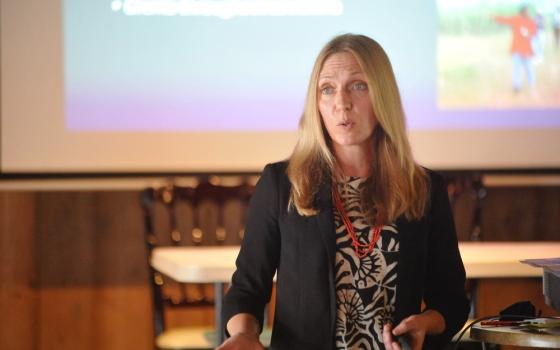JOURNEY TO THE COMMON GOOD
By Walter Brueggemann
Published by Westminster John Knox Press, $14
Walter Brueggemann’s 50-year career as a biblical scholar, prolific speaker and author has demonstrated both the inexhaustible nature of the Bible as sourcebook and the insatiable need of today’s faith communities for relevant guidance in addressing contemporary questions. From his best-selling 1978 book, The Prophetic Imagination, to this most recent book about the biblical basis for economic justice, Brueggemann has combined his academic lecterns and homiletic pulpits to drive home a consistent message -- that the core biblical paradigm of slavery/exodus/ covenant/liberation is nothing less than God’s voice in the global debates over militarism and world order, poverty and market capitalism, competitive self-interest and the fate of the human family on this planet.
The work of Old Testament scholars rarely escapes the academy. Brueggemann is a huge exception. His influence has extended far beyond his role as a minister in the United Church of Christ or his various academic appointments. Weary visionaries clinging to the Second Vatican Council, liberation theologians in Latin America, and ecumenical environmentalists have found in Brueggemann’s work a deep mining of the scriptures to support their ideas and activism. With 58 books and hundreds of articles under his belt, he has been a juggernaut for solid exegesis and daring homiletic application of Bible truth to modern crises.
Known for his approach to the Bible through rhetorical criticism, Brueggemann engages the text on its own terms and in historical context. As both scholar and believer, he sees the Word of God as a potent, creative force within the religious and cultural imagination of ancient Israel. Prophets are poets whose oracles create and destroy competing realities as they emerge in history.
 The foundation of Jewish identity is the Exodus story, which reveals God as the One who hears the cry of the oppressed and then responds to their need. This original narrative paradigm of liberation from slavery is the core memory within Jewish identity, repeated liturgically in the annual observance of Passover and renewed powerfully at the time of the destruction of Jerusalem and the Jewish exile to Babylon. In spite of their failure to live up to the covenant, God again rescues his people and leads them home.
The foundation of Jewish identity is the Exodus story, which reveals God as the One who hears the cry of the oppressed and then responds to their need. This original narrative paradigm of liberation from slavery is the core memory within Jewish identity, repeated liturgically in the annual observance of Passover and renewed powerfully at the time of the destruction of Jerusalem and the Jewish exile to Babylon. In spite of their failure to live up to the covenant, God again rescues his people and leads them home.
Each historical cycle reinforces the pattern: God hears the cry of the poor, shows the way out of slavery into freedom and abundant life. To fulfill the covenant, God’s people must live in right relationship with everyone, especially society’s marginalized -- widows, orphans and resident aliens. In Deuteronomy 6, Moses lays down the rules for a just economy. Everyone eats, gleaning is allowed, care for the weak mandated, natural resources belong to everyone, rest on the Sabbath, redistribution every seven years, no interest on loans, and debt forgiveness every 49 years. This produces neighborhood, protects the common good, ensures abundance for all. And the motive for such egalitarian sharing is the underlying memory of Exodus. Remember, you were once slaves, but God rescued you. Therefore, you must do the same to others.
This pattern repeats itself in the Jewish Jesus, who chose to read Isaiah 61 in the synagogue at Nazareth to inaugurate his own mission. “The Spirit of the Lord is upon me because he has anointed me: He has sent me to announce good news to the poor, to proclaim freedom to captives, sight to the blind, to let the broken victims go free, to announce a year of favor from the Lord” (Luke 4:18-19). To accomplish his mission, he will recapitulate the Exodus pattern and fulfill the Law and the Prophets by offering himself as victim for all the crucified of history, thus breaking the bonds of sin and death and leading God’s people beyond all limits to abundant life with God.
The breathtaking sweep of this journey, which Christians call the paschal mystery, becomes the mandate for believers to live the pattern personally and collectively as a force for social transformation and economic justice. Discipleship includes refusal to participate in any system, however big or powerful, that fails to promote the common good.
Brueggemann’s thrust has long put him on a collision course with all economic systems that exhibit the structural injustices of Pharoah’s model of production, a pyramid that extracts wealth from the majority of people at the bottom for the benefit of the privileged elite at the top. God’s rejection of that model condemns Egypt, Babylon, Greece, then Roman imperialism, all subsequent monarchical despotism and colonial exploitation. It continues in our time to reject any regime that hurts the common good. This includes the religious exceptionalism and global dominance long claimed by U.S. capitalism and militarism. The Bible, suggests Brueggemann, does not underwrite such arrogance, will subvert and punish it within history.
This is not easy reading, but it does offer the serious seeker a spirituality grounded in biblical sources that leads to an examination of both our national direction and personal lifestyles. Brueggemann has proved a valuable guide in that he not only challenges but also encourages his readers to see hope in crisis. If rapid advances in technology lead to heightened awareness and a collective response, if global dislocation forces fundamental reform, if environmental crises result in remedies, if violent stalemate leads to negotiation, the world may yet be called back from the brink.
God’s will for shared abundance in neighborhood must happen within history and requires human agency, but it also transcends history by inviting us to embrace suffering in solidarity with the poor and personal sacrifice for the sake of progress. What we do, or don’t do, in our families, neighborhoods, cities, regional patterns of economic and social activity, will influence the outcome of the current crisis.
The Bible, Brueggemann suggests, is inviting us to come to the headwaters of wisdom and love, imagine the world this inspires, then live it out each day. The future we want begins here and now.
[Pat Marrin is editor of Celebration, NCR’s sister publication. Walter Brueggemann’s talk, “From Biblical Narrative to Economic Policy,” delivered at the 2009 Celebration Conference on Effective Liturgy in Cincinnati, is posted online at NCRonline.org/channel/justice.]



